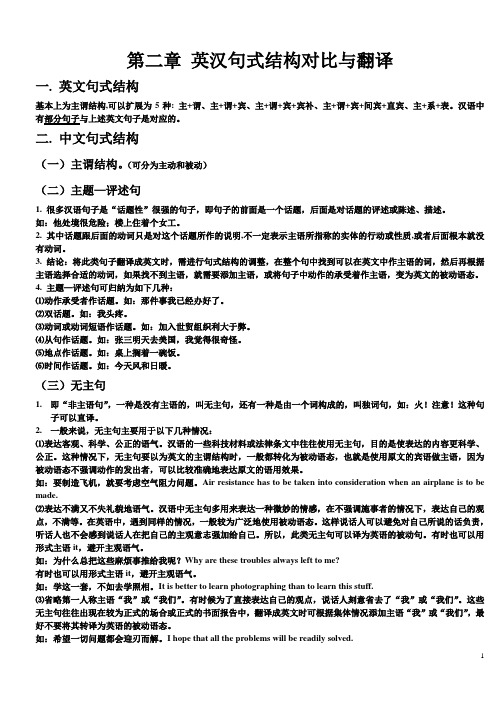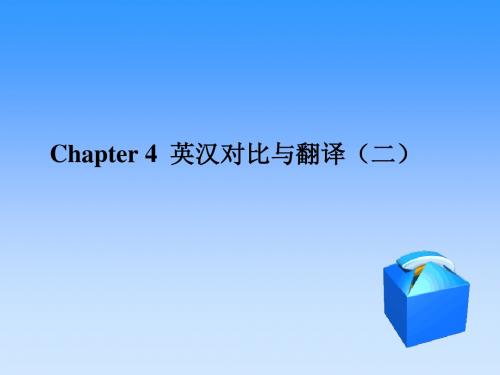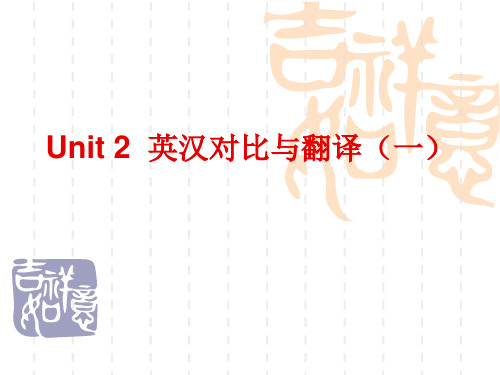英汉对比与翻译第二章
Unit 2 英汉对比和翻译 共18页

Ø 红茶
Ø Take off
3)词的搭配
Ø The new dictionary has really taken off. (popular)
Ø Take off your wet shirt
Ø The doctor took off his wounded left leg. Ø They had to take off (取消) the show because
衣衫褴褛,瘸腿,满脸胡须。
Ø 某些以-ible 或-able结尾的形容词用作定 语时,与every,the only,或形容词最高级 连用来修饰名词时,也常放在名词后
Ø We must help them in every way possible (every possible way). 我们一定要用一切可 能的办法来帮助他们。
of poor audience.
Ø You can take only one day off.
Ø The officer leading the inquiry has been taken
Collocation (continued)
Ø看 Ø 看电视 watch TV Ø 看黑板 look at the blackboard Ø 看电影 see a film Ø 看地图 study a map Ø 看小说 read a novel Ø 看朋友 visit a friend
Ø一个当选希望极微的候选人
5)set phrases:
Ø To make a monkey of
Ø To burn the boat
Ø To fish in the air
Ø To call a spade a spade
英汉翻译 英汉两种语言的对比

derivation, composition and conversion, etc.
4
第二章:英汉语言现象比较——构词比较
II. Word-building
The major ways of word-building in English are composition, conversion, and derivation (affixation). And in Chinese we have the same major ways. English:
Conversion: paper the window, empty the basket, elbow
one’s way, ups and downs, many ifs;
He bicycled off a moment ago.
5
第二章:英汉语言现象比较——构词比较
Derivation: able-unable, take-mistake, hope-hopelesshopelessness, act- inaction
Greek: paper, alphabet, dialogue, comedy
Chinese: tea, chow mein, kowtow, toufu,
Originally English had its gender, case, number,
conjugation—these complicated changes. Because of the
12
R
第二章:英汉语言现象比较——练习
I love my love with an E, because she's enticing; I hate her with an E, because she's engaged; I took her to the sign of the exquisite, and treated her with an elopement; her name's Emily, and she lives in the east. (Dickens, David Copperfield) 译2:
Unit 英汉对比与翻译 二

?D)Little did I then know the meaning of war and what it was in reality. (inverted)
?当时我确实 还不太懂战争的意义以及 战争实际上是怎么回事。
? E) By the time he entered college, he had been exposed to English for 6 years.
英汉对比与翻译 (二) 英汉句法现象的对比
2. 句法现象的对比
A: People are always talking about “the problem of youth”. If there is one—which I take leave to doubt—then it is older people who create it, not the young themselves. Let us get down to fundamentals and agree that the young are after all human beings—. There is only one difference between an old man and a young one: the young man has a glorious future before him and the old one has a splendid future behind him: and maybe that is where the rub is.
?人们总是在谈论 “青年人问题”。如 果真有这么一个问题 ——对这一点我 要不揣冒昧地表示怀疑 ——那也是年 长者造出来的,而不是青年人自己造 成的。让我们认真考虑一下问题的根 本吧,而且我们要承认青年人毕竟是 人——跟他们长辈一样的人。青年人 和老年人之间只有一点不同,那就是 青年人的光辉未来在他们前头,而老 年人的辉煌已经留在他们身后,或许 这就是问题之所在 。
第2章英汉对比与翻译

这就要求译者在英译汉时既要准确把握数量众多 的英语短语的意思,还应考虑汉语行文习惯,适 当使用汉语四字结构和排比句式。
译文:It is funny that a beautiful girl like her should fall in love with such an ugly man.
Conclusion:
5. 英语前重心;汉语后重心
英语句子叙事往往是前重心,汉语则习惯 于后重心。
英语句子往往先说最近发生的事,再说先 前发生的事,基本按时间逆序展开;或者 先叙述事实,再说出其发生的时间、地点、 方式手段。汉语正好与此相反。此外,英 语句子往往先给出观点、结论、推断,再 加以论证;而汉语句子则习惯于先说事, 再总结,往往采用“前因后果”句式。
Conclusion:
8. 英语句子主语很少省略;汉语多用无主 语句。
主语在英语句子中的地位是不可动摇的, 除了祈使句、人物对话、说明书或某些特 殊实用文体中有时可省略主语,一般不使 用无主语句。
英译汉时许多英语句子的主语可以考虑省 略;汉译英时,则应力求主语到位。
例15
原句:As we lived near the road, we often had the traveler or stranger visit us to taste our gooseberry wine, for which we had reputation, and I confess, with the veracity of a historian, that I never knew one of them to find fault with it.
实用英汉对比与翻译

第二章英汉句式结构对比与翻译一. 英文句式结构基本上为主谓结构,可以扩展为5种: 主+谓、主+谓+宾、主+谓+宾+宾补、主+谓+宾+间宾+直宾、主+系+表。
汉语中有部分句子与上述英文句子是对应的。
二. 中文句式结构(一)主谓结构。
(可分为主动和被动)(二)主题—评述句1. 很多汉语句子是“话题性”很强的句子,即句子的前面是一个话题,后面是对话题的评述或陈述、描述。
如:他处境很危险;楼上住着个女工。
2. 其中话题跟后面的动词只是对这个话题所作的说明,不一定表示主语所指称的实体的行动或性质,或者后面根本就没有动词。
3. 结论:将此类句子翻译成英文时,需进行句式结构的调整,在整个句中找到可以在英文中作主语的词,然后再根据主语选择合适的动词,如果找不到主语,就需要添加主语,或将句子中动作的承受着作主语,变为英文的被动语态。
4. 主题—评述句可归纳为如下几种:⑴动作承受者作话题。
如:那件事我已经办好了。
⑵双话题。
如:我头疼。
⑶动词或动词短语作话题。
如:加入世贸组织利大于弊。
⑷从句作话题。
如:张三明天去美国,我觉得很奇怪。
⑸地点作话题。
如:桌上搁着一碗饭。
⑹时间作话题。
如:今天风和日暖。
(三)无主句1.即“非主语句”,一种是没有主语的,叫无主句,还有一种是由一个词构成的,叫独词句,如:火!注意!这种句子可以直译。
2.一般来说,无主句主要用于以下几种情况:⑴表达客观、科学、公正的语气。
汉语的一些科技材料或法律条文中往往使用无主句,目的是使表达的内容更科学、公正。
这种情况下,无主句要以为英文的主谓结构时,一般都转化为被动语态,也就是使用原文的宾语做主语,因为被动语态不强调动作的发出者,可以比较准确地表达原文的语用效果。
如:要制造飞机,就要考虑空气阻力问题。
Air resistance has to be taken into consideration when an airplane is to be made.⑵表达不满又不失礼貌地语气。
英汉对比翻译Lesson 2(无作业版)

二、个性 1. 英语重视名词的分类 专有名词(proper noun)、普通名词(common noun) 普通名词:个体名词(individual noun)、集体名词 (collective noun)、物质名词(material noun)、抽 象名词(uncountable noun) • 个体名词+集体名词=可数名词(countable noun) • 物质名词+抽象名词=不可数名词(uncountable noun)
• • • • •
2)表示无生命的东西,一般前面加of Eg. the door of the teaching building 3)双重所有格 Eg. He is a good friend of my father’s.
说明父亲的好朋友不止一个。
He is a good friend of my father.
• 2. 复数名词 • 1)汉语在表达复数时,通常用语缀“们” • Eg. The students may work in teams or individually on this problem. • 同学们可以合作或独立解决这个问题。 • 2)有泛指意义的英语复数名词在汉译时不需使用复 数形式 • Eg. Cigarettes are harmful to our health. • 吸烟有害健康。
• 有些名词在不同场合,代表的意义不同, 可以 兼属两类(可数、不可数) • Eg. She bought chicken and turkey. 她买了鸡肉和火鸡肉。 • • She keeps chickens and turkeys. • 她饲养了一些小鸡和火鸡。
• 2. 名词性(gender)的形态化和词汇手段 • 1)汉语和英语中多数名词都是中性的,少数有生命 的名词需要阴阳性形式,通常采用词汇手段。 • Eg. she, girl, woman (she-wolf, girl-scout, woman-friend) • boy, man (boy-wonder, fireman) • 男/ 女(用于人)、公/母(用于动物)、雌/ 雄 (用于学名) • 坤(女性的):坤包(lady’s handbag)、坤表 (women’s watch)、坤车(women’s bike)
第二部分 英汉语言对比及标识翻译

Verb into Nouns 名词派生出来的动词,为符合汉语表达 习惯,可将其还原成名词来译。 A. He was blacklisted and lost his job. B. Such materials are characterized by good insulation and high resistance to wear.
I. Write
Section 6 Practice
First Street
第一大街
Do
Not Enter 请勿入内 YIELD 请让行!
II.
1.
Dangerous Bend 弯路危险 2. Entry to Motorway 机动车道入口 3. No Parking Except For Loading 禁止停车(装货车辆除外)
Come
In A Rush, Leave With A Flush.
Other Signs
1.
Left Baggage 行李寄存 2. Photography and video are not permitted inside the building 楼内禁止拍照、录像 The use of cameras or video equipment is prohibited
PEDESTRIAN
DO
NOT DISTURB 请勿打扰
5)文化 银狐美容美发中心 Silver Fox Beauty and Hair Design Center Fox 让人想到狐狸精,贬义。 Yinhu Beauty and Hair Design Center Yinhu Beauty Saloon and Hair Design Center
汉英比较与翻译Chapter-2PPT课件

.
2
思维方式
▪ 在观察某些事物现象时,不同民族、不同 地域的人们所取的角度及思维的方向有时 是完全不同的。表现在语言上,对同一事 物、行为或现象,东西方可能采用不同甚 至相反的语言表达形式,因而影响到语言 的基本结构、用词选句。中国人习惯说“6 岁以前”;英语则表示为under six。
.
3
▪ 又如在时间的先后概念上,英语中用back 指过去的时间,而用forward指称未来的时 间,而中国人的思维方式与此相反,用 “前”指过去的时间,用“后”指称未来 的时间。也就是说中国人是面向着过去来 区分时间先后的,而英美人是面向着未来 区分时间先后的。类似的例子还有很多。
高山、草原等区域的人,思维方式也有不同,如
居住大陆从事农业的人:缺乏与其他文明的交流与竞争,眼界狭窄
▪ 思维内向、保守、迟缓;安土重迁,乡土观念强
▪ 群体主义观念强, 执着民族意识
▪ 内省自求,重人际和谐,竞争意识淡薄
▪ 重农轻工商,重义轻利,重实用技术轻科学理论
居住沿海从事工商航海业的人:经常与外界交流与竞争,眼界开阔
▪ 思维外向、开放、敏捷;以四海为家,常流动奔波,乡土观念弱
▪ 个体主义观念强,热爱自由民主
▪ 向外进取,重竞争、扩张
▪ 重工商、航海,重功利,重科学. 技术理论
11
3. 思维方式的社会特征
性别、年龄、职业、教育程度不同,思维方式也不同,如:
男性:偏于抽象思维,有较强的逻辑分析能力
▪ 善于运用概念、判断、推理认识事物,重理性
篇章、语用 → 跨语言、跨文化、跨学科
▪ 微观 → 宏观,微观 + 宏观
▪ 文化:物质文化、行为文化、制度文化、观念文化
.
英汉对比(第二章)

4. Omission
5. Inversion (In Chapter one we learned nine
kinds of inverted sentences.) B. The reason for compact sentence patterns in English 1. English has inflected forms, various kind of connectives, expletives (it, there) and so on.
below: S (sentence) =NP (noun phrase) +VP (verb phrase). No matter how complex an English sentence may be, there is a basic structure in it, i.e. the S-V concord, which forms the kernel of English sentences.
(3) Principle of proximity Principle of proximity denotes agreements of verb
with whatever noun or pronoun closely precede it, sometimes in preference to agreement with the headword of the subject, e.g. (see students’ book P. 36)
It
is agreed that Chinese sentences are constructed in pace with thought flow, each part of a sentence being in connection with a topic rather than a single subject.(英语注重主语,基本句型有 七种,并都可以看作是SV演化而来的,汉语注重主 题,经常通过一种把句首成分看作话题加以评论的 句型-主题句进行描写,话题与评论在语法关系上表 现为主题与述题的关系。)
Chap 4 英汉对比与翻译(二) BY Mrs. Huang

Examples:
1. That is our policy and that is our declaration. —— W. Churchill 这就是我们的国策。这就是我们的宣言。 这就是我们的国策。这就是我们的宣言。 2. First, we make clear what is doing the travelling —— a car, a bus, a plane or whatever it may be. 首先,我们要搞清旅行工具,例如小汽车、 首先,我们要搞清旅行工具,例如小汽车、公 共汽车、飞机或别的可用工具。 共汽车、飞机或别的可用工具。
Examples:
1. A dialect is known by every linguist in this room. 有一种方言这间屋子里的每个语言学家都懂得 有一种方言这间屋子里的每个语言学家都懂得。 这间屋子里的每个语言学家都懂得。 比较:在这房间里的每位语言学家都懂一种方言。 比较:在这房间里的每位语言学家都懂一种方言。 2. You don’t grow the grain you eat and you don’t make the clothes you wear. 你吃的粮食不是你自己种的 你穿的衣服也不是你自己做的 你吃的粮食不是你自己种的,你穿的衣服也不是你自己做的。 不是你自己种的, 也不是你自己做的。 比较:你不种…… 比较:你不种……
Chapter 4 英汉对比与翻译(二) 英汉对比与翻译(
Contents:
1. Hypotactic vs. Paratactic (形合与意合 形合与意合) 形合与意合 2. Complex vs. Simplex (简约与繁复 简约与繁复) 简约与繁复 3. End-weight vs. Top-heavy 4. Subject-prominent vs. Topic-prominent 5. Static vs. Dynamic(静态与动态 静态与动态) 静态与动态 6. Impersonal vs. Personal 7. Practice
Unit 2 英汉对比

For example:
Can you answer a question which I want to ask and which is puzzling me?
我有一个问题弄不懂,想请教你,你能回答吗?
In the doorway lay at least twelve umbrellas of all sizes and colors.
人(若)不犯我,我(则)不犯人。〔语序) We will not attack unless we are attacked
.发展体育运动,增强人民体质。 Promote physical culture, and build up People’s health.
Each of the broadcasting companies is linked to approximately 200 affiliated stations to
Hypotaxis is the dependent or subordinate construction or relationship of clauses with connectives.
Parataxis is the arranging of clauses one after the other without connectives showing the relation between them.
Cultural Differences between Western Countries and China
I. Different customs II. Different associations III. Different beliefs and values IV. Different etiquette
英汉语言对比与翻译第2讲课后思考题

3. It was only my capacity for hard work that saved me from early dismissal.
Difference 3
English : Static (静态)
英汉语言对比与翻译 Contrast and Translation between
English and Chinese
Lecture 2 英汉语系统对比与翻译
小结
1
被动与主动
2
物称与人称
3
静态与动态
翻译下面三张PPT的 句子,并结合本讲内容 找出英汉表达的不同点。 10月16日上课检查。
课后思考
Difference 1 English : Passive (被动) Chinese: Active (主动)
课后思考
1. Astonishment and even horror oppressed him.
2. Excitement deprived me of all power of utterance.
1. They are paid for this. 2. The difficulties have been
overcome, and the problem solved. 3. Table tennis is played all over China. 4. Why should all these unpleasant jobs be pushed on to me?
出来。
3. The sight of the big tree 我一看到那棵大树就想 always reminds me of my 起了童年的情景。 childhood.
第2章 英汉对比与翻译

confusing information about risks.
译文:从核安全到食品添加剂等自相矛盾又令人困惑
的危险信息纷至沓来。
例5
原文:本地区严禁砍伐松林。
译文:No one is allowed to clear-cut the pine forest
in this region. /Pine tree felling is prohibited here!
翻译时,为适应汉语行文习惯,英语的被动语态往往可 以考虑翻译成汉语的主动结构。另外,英译汉时,要尊 重汉语习惯,多使用动词或短语组句;多用流水句,少 用长句;多用人称主语,少用非人称主语;多使用主动 结构,少使用被动结构。
例6
原文:不入虎穴,焉得虎子
译文:If one does not enter the tiger’s den, how
Conclusion:
3. 英语多被动(Passive);汉语多主动(Active)
英语多使用被动语态,汉语则较少使用。英语使用被动 语态主要是为了强调句子的动作承受者;不知道或没必 要说出动作的执行者;为了行文准确客观。英语的论说 文体特别是科技文章,使用被动结构的概率有时可多达 75%以上,因为西方人在陈述道理时推崇“客观性”, 而十分忌讳主观推论。
例8 原文:The metal was cooled in the air,
having been heated to a definite temperature in the furnace.
译文:这种金属先在炉内加热到一定温度, 而后置于空气中冷却。
例9
原文:像她那么漂亮的姑娘竟爱上了这么 一个丑八 怪,真有意思!
第2章 英汉对比与翻译

Conclusion:
8. 英语句子主语很少省略;汉语多用无主 语句。
主语在英语句子中的地位是不可动摇的, 除了祈使句、人物对话、说明书或某些特 殊实用文体中有时可省略主语,一般不使 用无主语句。
英译汉时许多英语句子的主语可以考虑省 略;汉译英时,则应力求主语到位。
例15
原句:As we lived near the road, we often had the traveler or stranger visit us to taste our gooseberry wine, for which we had reputation, and I confess, with the veracity of a historian, that I never knew one of them to find fault with it.
译文:It is funny that a beautiful girl like her should fall in love with such an ugly man.
Conclusion:
5. 英语前重心;汉语后重心
英语句子叙事往往是前重心,汉语则习惯 于后重心。
英语句子往往先说最近发生的事,再说先 前发生的事,基本按时间逆序展开;或者 先叙述事实,再说出其发生的时间、地点、 方式手段。汉语正好与此相反。此外,英 语句子往往先给出观点、结论、推断,再 加以论证;而汉语句子则习惯于先说事, 再总结,往往采用“前因后果”句式。
翻译时,为适应汉语行文习惯,英语的被动语态往往可 以考虑翻译成汉语的主动结构。另外,英译汉时,要尊 重汉语习惯,多使用动词或短语组句;多用流水句,少 用长句;多用人称主语,少用非人称主语;多使用主动 结构,少使用被动结构。
《英汉对比研究》第2章+聚集与流散

《英汉对⽐研究》第2章+聚集与流散《英汉对⽐研究》第2章聚集与流散第⼆章聚集与流散(Compact vs(Diffusive)英语句⼦有严谨的主谓结构。
这个结构通常由名词性短语(NP)和动词性短语(VP)构成。
主语不可或缺,谓语动词是句⼦的中⼼,两者协调⼀致(S,V concord),提纲挈领,聚集各种关系⽹络(connective,nexus)。
因此,英语句⼦主次分明,层次清楚,前呼后拥,严密规范,句式呈“聚集型”(compactness)。
英语的主语和谓语动词搭配,形成句⼦的核⼼(kernel),谓语动词控制句⼦主要成分的格局。
句⼦尽管错综复杂,千变万化,但根据谓语动词的类别和特征,都可以把英语的主谓结构归结为五种基本句型,即,SV,SVP,SVO,SVOO,SVOC: 基本句型(⼀)主语⼗动词The telephone rang(电话铃响过了。
The meeting has begun(会议开始了。
基本句型(⼆)主语⼗动词⼗表语We are students(我们是学⽣。
She appeared cheerful(她显得很⾼兴。
基本句型(三)主语⼗动词⼗宾语Labor created man(劳动创造了⼈。
The news surprised me(这消息使我感到惊奇。
基本句型(四)主语⼗动词⼗间接宾语⼗直接宾语She sang us a song(她给我们唱了⼀⾸歌。
I sent him a letter(我给他寄了⼀封信。
基本句型(五)主语⼗动词⼗宾语⼗宾语补⾜语He painted the door green(他把门漆成绿⾊。
We elected him our monitor(我们选他当班长。
英语各种长短句⼦,⼀般都可以看作是这五种基本句型及其变式、扩展、组合、省略或倒装:1、基本句型的变式。
上述五种基本句型都是陈述句、肯定句和主动句。
由这些基本句型可以转换为以下⼏种主要的变式:a)陈述句变疑问句。
英汉语言对比与翻译

英汉语言对比与翻译第一章绪论第一节翻译的作用无论在中国还是在西方,翻译都是一项极其古老的活动。
在整个人类历史上,语言的翻译几乎同语言本身一样古老。
从原始部落之间的交往到现代文明的传播;从古罗马帝国到现代欧洲共同体的发展,从基督教的传播到佛教的弘扬,首先应归功于翻译活动的进行。
文明的保存与传播、社会的发展与进步,无不是通过翻译工作者的参与而得以实现的。
纵观中西方翻译的历史,我们不难发现翻译在文明、社会发展的历史中起着首要的作用。
公元前三世纪西方翻译揭开了它的第一页。
七十二名犹太学者聚集在埃及的亚历山大城把《圣经·旧约》由希伯来语翻译成希腊语,用以满足亚历山大城中说希腊语的犹太人的需要,书名叫《七十子希腊文本》。
自公元前四世纪开始至今的两千多年的时间里,西方的翻译曾出现过五次翻译高潮(或可分为五个发展阶段)。
第一次是公元前四世纪末,希腊社会走向衰落,但希腊文化依然光辉灿烂,逐渐强大的罗马文化较之逊色不少。
被誉为罗马文学三大鼻祖的安德罗尼柯、涅维乌斯和恩尼乌斯,以及后来的普劳图斯、泰伦斯等大文学家都用拉丁语翻译或改编荷马史诗和大批的希腊著名文学作品,把古希腊文学特别是戏剧介绍到罗马,促进了罗马文学的诞生和发展,对于罗马以致日后西方继承古希腊文学起了重要的桥梁作用。
西方第二次翻译高潮出现在公元四——六世纪,即罗马帝国的后期至中世纪初期。
这个时期的翻译主要以宗教文献为主。
在西方宗教势力强大,他们敌视世俗文学,极力发展服务自身的宗教文化,《圣经》被奉为基督教经典。
于是,由希伯来语和希腊语写成《圣经》和其他宗教作品的拉丁语翻译和诠释轰动一时,在取得了教会文化上取得垄断地位,以哲罗姆翻译的《通俗拉丁文本圣经》为定本,标志《圣经》翻译取得与世俗文学翻译分庭抗礼的重要地位。
随着罗马帝国的分裂,《圣经》也被翻译成各自小国语言,使宗教翻译占有更大市场。
中世纪中后期,即十一至十三世纪之间,是西方翻译史上的第三次高潮。
英汉对比与翻译_2

can can’t
can can’t
can can’t
can can’t
揍 敢 试 瞧 逃 怕
Please compare:
• “Tom didn’t go to school today, did he?” asked the mother. • “No, he didn’t,” Mary said. • “汤姆今天没去上 学,是吗?”母 亲问。 • “不,他没去。” 玛丽说。 • “是的,他没 去。”玛丽说。
“我会揍你的。” “不,你不会。” “是的,我会的。” “不,你不会的。” “我会的。” “你不会的。” “会!” “不会!”
Chinese: moving point of sight (视点流动)
“I can lick you.” “No, you can’t.” “Yes, I can.” “No, you can’t.” “I can.” “you can’t.” “Can!” “Can’t!” 我要揍你。 你敢! 敢又怎么样? 那你就试试吧! 试试?哼,你等着瞧! 等着瞧?我才不怕呢! 不怕,好,那你休想逃走。 谁逃了?来呀,你揍啊!
Please compare:
“I can lick you.” “No, you can’t.” “Yes, I can.” “No, you can’t.” “I can.” “you can’t.” “Can!” “Can’t!” 我要揍你。 你敢! 敢又怎么样? 那你就试试吧! 试试?哼,你等着瞧! 等着瞧?我才不怕呢! 不怕,好,那你休想逃走。 谁逃了?来呀,你揍啊!
English
Form-focused with emphasis on explicit cohesion (显性联接) Hypotactic
- 1、下载文档前请自行甄别文档内容的完整性,平台不提供额外的编辑、内容补充、找答案等附加服务。
- 2、"仅部分预览"的文档,不可在线预览部分如存在完整性等问题,可反馈申请退款(可完整预览的文档不适用该条件!)。
- 3、如文档侵犯您的权益,请联系客服反馈,我们会尽快为您处理(人工客服工作时间:9:00-18:30)。
d) Omisห้องสมุดไป่ตู้ion
• A serious matter this for you and me. (= A serious matter is this for you and me./ This is a serious matter for you and me.) 对你和我来说,这是件严重的事情。
• b) extension of sentence parts • Adverbial extension • It would be nice if one had two heads and neither required sleep.
b)Expansion
• b) extension of sentence parts
a)Conversion
―There be…‖ • There was a knock at the door.
b)Extension
b)Extension
• a)adding modifier • Now the integrated circuit has reduced by many times the size of the computer of which it forms a part, thus creating a new generation of portable minicomputers.
• 钢的结构及其形成的性质,取决于加热的温度和冷却 的速度。
c) Combination
c) Combination
• Simple sentences • Compound sentences • Complex sentences
c) Combination
• A few stars are known. • The stars are hardly bigger than the earth. • The majority of the stars are large. • Thousands of earths could be packed inside each and leave room to spare. •
c) Combination
• A few stars are known which are hardly bigger than the earth, but the majority are so large that hundreds of thousands of earths could be packed inside each and leave room to spare.
• • • • • SV The telephone rang. SVP We are students. SVO Labour created man. SVoO She sang us a song. SVOC He painted the door green.
2) Changes of basic sentence patterns
• 周恩来的房门打开了。他们看到了一位身材修长的人,比 普通人略高,目光炯炯,面貌引人注目。称得上清秀。
b)Extension
• • • • b) extension of sentence parts Subject extension The drinking of the water is dangerous. Who will be the winner is not known yet.
a)Conversion
• Affirmative Negative • The telephone rang. • The telephone did not ring.
a)Conversion
• Active Passive • He painted the door green. • The door was painted green.
d) Omission
d) Omission
• To err is human, to forgive divine. • 人孰能无过,恕过者神。
d) Omission
• If one had but two heads and neither required sleep! • (= It would be nice if one had but two heads and neither required sleep!) • 人要是有两个脑袋,而且都不需要 睡觉,那就好了!
e) Inversion
• Deal with us nobly, women though we be.
• 虽然我们是妇女,请以高尚的态度 对待我们。
e) Inversion
• Never was night so still; never was a sky so deeply blue, nor stars so bright and serene. • 夜从无如此沉寂,天从无如此深蓝, 星亦从无如此明亮。
Chapter Two
• Compact vs. Diffusive • 聚集与流散
Chapter Two Compact vs. Diffusive
• 1. Compact English sentences • 2. Diffusive Chinese sentences • 3. Difference between English and Chinese sentence patterns • 4. Translation
b)Expansion
• • • • b) extension of sentence parts Object extension I want to know all his secrets. The structure of the steel depends on how hot the steel gets and how quickly it is cooled.
e) Inversion
e) Inversion
• The greatest truths are the simplest, so are the greatest men.
• 最伟大的真理总是最朴素的,最伟 大的人物也是最朴素的。
e) Inversion
• Neither could theory do without practice, nor (could) practice (do) without theory. • 理论离不开实践,实践也离不开理 论。
• 人们所知道的几个星球并不比地球大多 少,但绝大多数的星球却足以容纳成千 上万个地球还绰绰有余。
•
Our Charter, being a historical product, has its limitations, and although we have always considered that strict respect for the principles it embodies is the key to considerable progress in international coexistence, we now venture to suggest certain changes, which are technical rather than political, to improve the machinery available to the Organization, since the lofty aims to which we aspire will be the more readily attainable the better the machinery at our disposal.
d) Omission
• Every language has its peculiarities; they are established by usage, and whether (they are) right or wrong, they must be complied with. • 每种语言都有特点,这些特点是在 习惯使用中形成的,不论正确与否, 都得遵守。
c) Combination
• 我们的宪章,作为历史产物,有其局限 性。因此,尽管我们一向认为,严格地 尊重宪章所体现的原则是国际共处中取 得可观进步的关键,我们仍然冒昧地建 议作出某些变更——技术性的而非政治 性的变更——借以改善本组织现有的机 构,因为我们所掌握的机构越完善,我 们所向往的崇高目标就越容易达到。
• The kaleidoscope of shifting interests of the nations during the negotiation made it impossible to sort out the ―winners‖ and ―losers‖.
• 谈判期间,各国的利益变化不定,好像万花筒似的, 这就使人难以分辨出究竟谁是“胜者”,谁是“输 家”。
b)Expansion
• b) extension of sentence parts
• The structure of the steel and the resulting properties will depend on how hot the steel gets and how quickly or slowly it is cooled.
b)Expansion
• b) extension of sentence parts • Attribute extension • Can you see the girl who is wearing a blue skirt? • He is a man of great talent.
